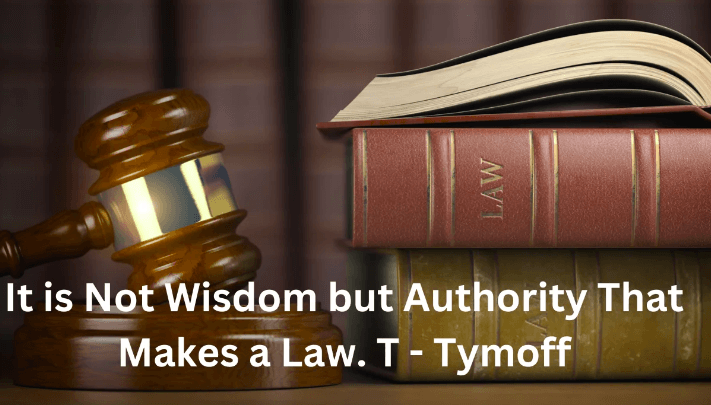It Is Not Wisdom But Authority That Makes a Law. T – Tymoff

In discussions about governance and societal norms, the phrase “It Is Not Wisdom But Authority That Makes a Law. T – Tymoff. T – Tymoff” provides a critical lens through which we can examine the nature of laws and their enforcement. This assertion compels us to consider the distinction between wisdom as a guiding principle and authority as the power that creates and enforces laws.
The Nature of Authority
When we assert that “It Is Not Wisdom But Authority That Makes a Law. T – Tymoff,” we highlight the fundamental role of authority in legal systems. Authority is the legitimate power bestowed upon individuals or institutions to enact rules and regulations. While wisdom may inform the creation of laws, it is authority that ensures their implementation. This distinction raises important questions about who wields power and how that power is exercised.
The Role of Wisdom in Lawmaking
Wisdom certainly plays a crucial role in the crafting of just and equitable laws. However, as the statement “It Is Not Wisdom But Authority That Makes a Law. T – Tymoff” suggests, wisdom alone is often insufficient for the enforcement of those laws. The creators of laws may possess wisdom, but without the backing of authority, their insights may never materialize into enforceable regulations. Thus, while wisdom is vital, authority is what gives laws their weight and power.
Historical Perspectives
Throughout history, there are numerous examples that illustrate the principle “It Is Not Wisdom But Authority That Makes a Law. T – Tymoff.” Many unjust laws have been enacted by those in power, often disregarding ethical considerations. For instance, discriminatory laws have been implemented by authorities despite widespread recognition of their injustice. This historical context reinforces the need to scrutinize the motivations of those who wield authority and the implications of their decisions.
Read Also: Self-Control Is Strength. Calmness Is Mastery. You – Tymoff
Modern Implications
In contemporary society, the phrase “It Is Not Wisdom But Authority That Makes a Law. T – Tymoff” remains highly relevant. It prompts us to question the legitimacy of laws and the authority behind them. Are laws crafted with the welfare of the populace in mind, or do they serve the interests of a select few? This critical examination is essential for fostering a just society and ensuring accountability among those in power.
Read Also: Crypto30x .com
Finding a Balance
To achieve effective governance, it is crucial to find a balance between wisdom and authority. While authority is necessary for enforcing laws, wisdom is essential for crafting laws that reflect justice and societal needs. The assertion “It Is Not Wisdom But Authority That Makes a Law. T – Tymoff” reminds us that the most successful legal systems are those that integrate both elements, allowing for wise guidance in the lawmaking process.
Conclusion
Ultimately, the phrase “It Is Not Wisdom But Authority That Makes a Law T – Tymoff” serves as a poignant reminder of the complexities within our legal systems. Recognizing the power dynamics at play can lead us to advocate for more equitable laws that reflect not only authority but also the wisdom necessary for true justice. By striving for a balance between these two forces, we can work toward a society that respects both the letter and the spirit of the law.
FAQs About It Is Not Wisdom But Authority That Makes a Law. T – Tymoff
1. How does the phrase “It Is Not Wisdom But Authority That Makes a Law. T – Tymoff” influence our understanding of justice?
This phrase encourages us to realize that justice is not solely a product of wise legislation but is deeply intertwined with the authority that enforces those laws. It prompts critical thinking about the sources of our legal systems.
Read Also: TSLA: An Overview of Tesla
2. What actions can citizens take to ensure both wisdom and authority are present in lawmaking?
Citizens can engage in civic activism, advocate for inclusive policy discussions, and demand accountability from their leaders. By participating in the legislative process, they can help ensure that both wisdom and authority inform the creation of laws.




